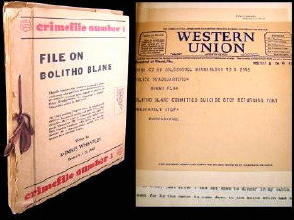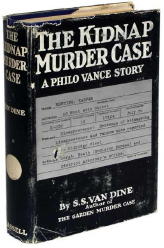Mon 2 Mar 2009
While I never read any of the Mrs. Warrender stories I did read several of the Supt. Wilson ones, and eventually had to grant the chief criticism of the Coles put forward by Haycraft and others, that the Coles put together a fair puzzle but they were awfully dull. I’ll check out some of the Warrender tales and see if that still holds. Someone once said of Daniel DeFoe that he “employed dullness brilliantly” but that’s hardly a virtue in a detective story.
The Coles were hardly alone in the category of being dull reads. I enjoy many of Freeman Wills Crofts’ books and those of John Rhode, but though both could get some action going, both could be pretty dull too. There’s a certain charm the first time you encounter one of Crofts’ timetables, but it grows thin fairly soon, and some of Rhode’s later Dr. Priestley books could be used to cure insomnia.

One of the problems with the classical tec tale is it sometimes got so involved with the puzzle and the rules it forgot the rule about entertaining.
The absurd length that this was taken to was in the Dennis Wheatley books, which presented you with characters, motive, even clues like cigarette butts, but you had to play the detective. Alas they pointed out the problem that murder wasn’t much fun without a good detective and things like a plot and real story. They might be fun for a party game but they weren’t much to curl up before the fire with.
One of the reasons we still read Christie, Marsh, Sayers, and Allingham when so many others have gone the way of the dodo is that they weren’t afraid of a little melodrama, adventure, intrigue, romance, and action. Philip MacDonald was often criticized at the time for introducing too much suspense and action into his Anthony Gethryn novels, but as a result many of them are better reads today than clever puzzlers like Anthony Berkley’s The Poisoned Chocolates Case where everyone talks and talks and nothing much happens.

Towards the end of the classical era even S.S. Van Dine felt the need for Philo Vance to get involved in a car chase and running gun fight (The Kidnap Murder Case). I never understood why dullness was supposed to be a literary virtue in the detective novel.
That said, R. Austin Freeman’s Dr. Thorndyke stories and novels contain few thrills, but the structure of the plot, the joys of watching Thorndyke’s careful and methodical investigation, and the reconstruction of the crime by Thorndyke at the end hold the reader as well as any shocker or thriller.
But then Freeman was, in Chandler’s words, “the best dull writer,” and Thorndyke a character who, while largely forgotten today, deserves to sit very near the top with Holmes, Father Brown, Poirot, and Maigret. In the right hands even dullness can be a virtue, though not one to be imitated by would be writers.
March 4th, 2009 at 8:20 am
Since we are discussing British mystery fiction perhaps this is a good time for me to mention a new publication, BRITISH CRIME WRITING, AN ENCYCLOPEDIA edited by Barry Forshaw. Two volumes, 867 pages, published by Greenwood World Publishing at $149.00. A stiff price yes, but I believe well worth the cost if you are a mystery and detective reader. Copies are available at amazon.com.
There are detailed entries on all the major British mystery authors from the so called “dull” classic puzzle writers like Crofts and the Coles, to the better classic authors such as Christie, Sayers, etc. The more recent British crime writers are also covered. For instance Ian Rankin has five page entry.
But the book deals not only with the writers but with the British crime magazines, films and television shows. There are 16 magazines covered, each with a separate entry. London Mystery Magazine has three pages, Suspense and Edgar Wallace Mystery Magazine each have two pages, etc.
25 movies are covered, each with a detailed entry. Many television series are discussed, each with a separate essay, including such major shows as Inspector Morse, Touch of Frost, Wire in the Blood, Cracker, Prime Suspect, Sherlock Holmes, etc.
The entry on Pulp is over four pages and British noir is also covered. I highly recommend this book and it’s worth the price. This is a major publication on an important topic.
March 4th, 2009 at 10:37 am
Walker
Maybe I should pre-ordered it from Amazon, because I’m still waiting for my copy. I ordered it the same day that I saw it was available.
Your comments mean that I will be anxiously waiting for the mailman every day until it gets here.
Well, I do that every day. What I meant was more anxiously than usual.
— Steve
March 4th, 2009 at 2:58 pm
No more anxious waiting. It arrived fifteen minutes ago, air mail direct from England from The Book Depository (highly recommended).
Obviously I’ve haven’t had a chance to do more than open it up and flip through the pages, but what a handsome looking two-volume set it is.
There’s going to be lot in it to read and digest (and disagree with in part, I’m sure) over the next month or so.
As Walker suggests, this is a significant piece of work that can’t fail to be useful for a long time to come.
— Steve